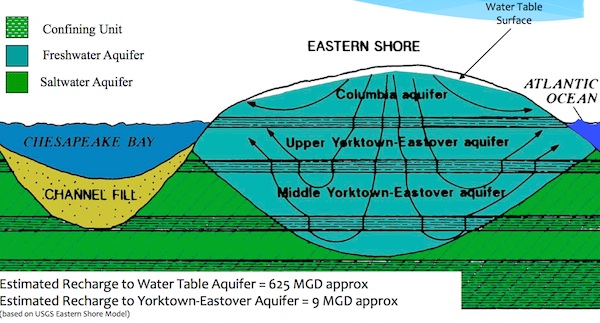Don’t Like Town Water? It Could Get Worse

SOLE-SOURCE AQUIFER DETAIL
By DORIE SOUTHERN
Cape Charles Wave
July 21, 2014
There’s a limited supply of groundwater in the Cape Charles vicinity, and the town needs to prepare to deal with saltwater intrusion now. That’s according to Elaine Meil of the Accomack-Northampton County Planning District Commission, who addressed the Cape Charles Planning Commission June 30. Meil said the problem is still a few years away, but that the town needs to begin planning for it.
According to groundwater modeling done by the United States Geological Survey, “saltwater intrusion can be expected in town wells over time and the town should be aware of this problem,” Meil said, adding that:
- Groundwater studies have shown limited groundwater in the Cape Charles vicinity. This is a natural feature of the area.
- The Eastern Shore of Virginia Ground Water Committee works extensively on groundwater issues and they have funded the USGS to develop a groundwater model. This model is the best source of information regarding changes to groundwater in the Cape Charles area.
- Long term, the Town may need to change water treatment technologies or obtain water from the Eastville area of Northampton County or possibly from the southern tip.
Town staff has applied to renew the 10-year DEQ (Department of Environmental Quality) Groundwater Withdrawal Permit at 68 million gallons per year, a reduction from 252 million gallons per year. The current use is just under 40 million gallons per year, Meil noted.
CONTINUED FROM FIRST PAGE
In 2009 Cape Charles rejected a proposal from Webtide, a private investment group, for a public-private partnership that would have supplied water to Cape Charles and Cheriton from deeper wells farther from the Bay.
Following Meil’s presentation, Planning Commissioner Bill Stramm said, “We need to monitor drinking water quality. For a lot of people in this town the drinking water is a big thing. I can’t drink it.”
Stramm is not alone. A number of residents report that they do not drink tap water from the town water supply.
The town monitors the drinking water and recently distributed door-to-door the Cape Charles Drinking Water Report 2013. The report is “designed to provide details about where your water comes from, what it contains, and how it compares to standards set by regulatory agencies. . . . This report is a snapshot of last year’s water quality. We are committed to providing you this information because informed customers are our best allies,” it says.
The report states that the town conducted tests for 80 contaminants and detected only eight reportable ones in Cape Charles water, with only one of them at a level higher than the Environment Protection Agency allows.
The level of TTHM (Total Trihalomethanes) was high enough to violate and exceed EPA guidelines, the report said. Trihalomethanes are a by-product of disinfectants that are used to control microbial contaminants. The town reported that the average contamination was only 1 part per billion over the allowed amount, but the range of the testing was a low of 35 and a high of 107, which averaged 81 parts per billion.
According to the report, “Some people who drink water containing trihalomenthanes in excess of the Maximum Contamination Level over many years may experience problems with their liver, kidneys or central nervous system, and may have an increased risk of getting cancer. The violation occurred during the second quarter. Our running average was 1 part per billion over the Maximum Contamination Level. The violation was for that quarter only. We flush the water distribution system regularly. Flushing the system helps keep the water system compliant.”
CLICK to view Meil’s slideshow on both town drinking water and wastewater.




















Regarding the possibility of salt water intrusion and limitations of fresh water in Cape Charles; Israel already has working desalination technology that could mitigate both problems. California has already tapped Israeli companies to set up plant in that State.